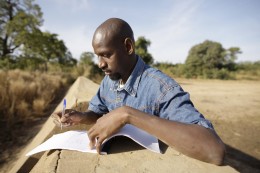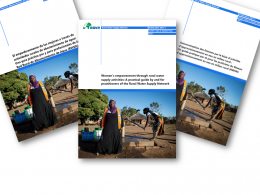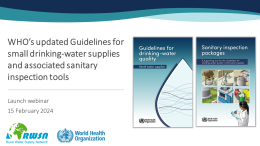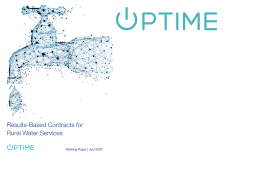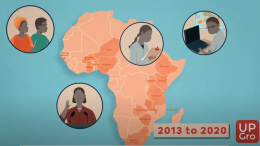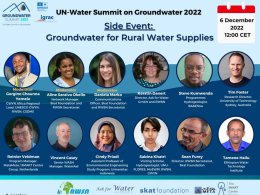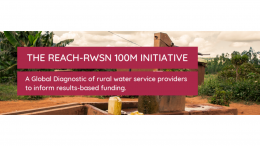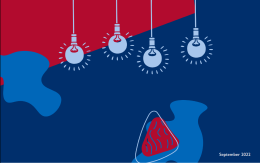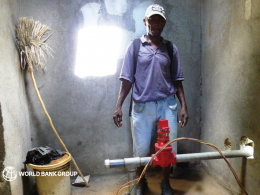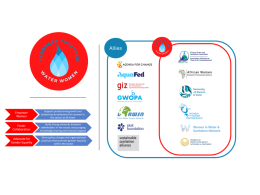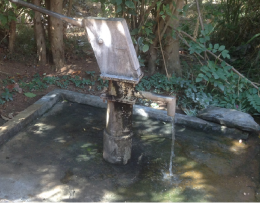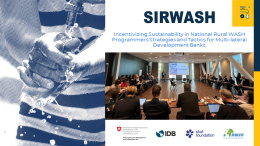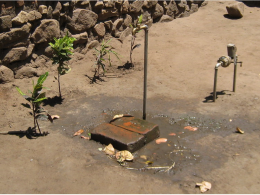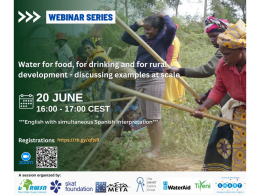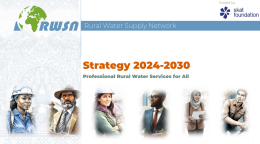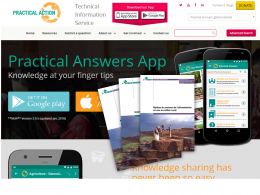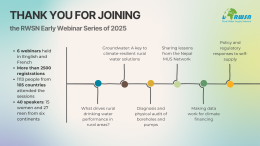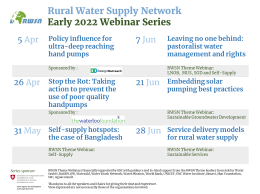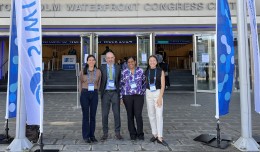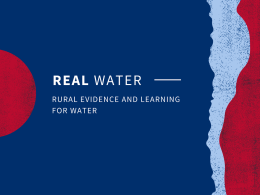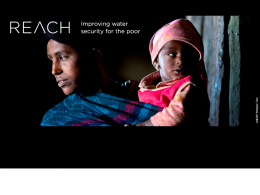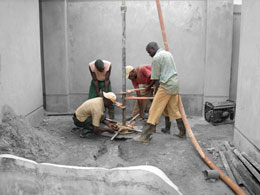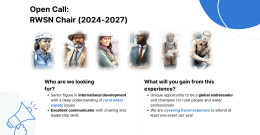Highlights of RWSN's projects, partnerships and knowledge products
Collaborations
Writing Course for WASH Professionals
Skat, WaterAid, SHARE, Waterlines Journal
Project start: 2012 • Project finished: -
Collaborators: RWSN, Skat, WaterAid, SHARE, Waterlines Journal
Funder: SHARE
Summary
The ChallengeOver 2.5 billion have no access to improved sanitation and 780 million people lack access to improved sources of drinking water, according to the WHO/UNICEF Joint Monitoring Programme (2012). The numbers are staggering. The suffering is real. The challenge to overcome is immense. Success can only come through a combination of action and communication. Both are critical.
We have a vision where Water, Sanitation and Hy-giene (WASH) professionals are regularly sharing and learning – at all levels from districts to global networks. As a sector, we also need to reach out and communicate with wide range of audiences: politicians, policymakers, companies, water users, and the public in all countries.
We often have the content: experiences, data, pro-jects, methodologies and stories of success and failure. What we are often not great at is explaining ourselves to others in a way that leads to positive action.
We want to change that.
Women’s empowerment through rural water supply / Autonomisation des femmes par le biais d’activités d'approvisionnement en eau en milieu rural
A practical guide / Un guide pratique / Una guía práctica
Project start: 2020 • Project finished:
Collaborators: RWSN Members from the Leave No-one Behind Community
Funder: SDC
Summary
This practical guide is the result of a consultation and co-creation process with members of the Rural Water Supply Network (RWSN). Engineers and gender experts have come together to overcome jargon barriers from their respective disciplines. This guide aims to pro-vide water specialists with the language and knowledge on how best to work with gender experts to build more transformative activities.Ce guide pratique est le fruit d'un processus de concertation et de cocréation avec les membres du réseau d’approvisionnement en eau en milieu rural (Rural Water Supply Network, RWSN). Des ingénieurs et des spécialistes des questions de genre se sont réunis pour faire tomber les barrières du jargon de leurs disciplines respectives. Ce guide a pour but d'apporter aux spécialistes de l'eau le langage et les connaissances sur la meilleure façon de travailler avec des spécialistes des questions de genre pour élaborer des activités plus transformatrices.
Esta guía práctica es el resultado de un proceso de consulta y de co-creación con miembros de la Red Rural de Abastecimiento de Agua (RWSN). Ingenieros y expertos en género se han unido para superar las barreras que supone la jerga de sus respectivas disciplinas. Esta guía tiene como objetivo proporcionar a los especialistas en agua el lenguaje y el conocimiento sobre la mejor manera de trabajar con expertos en género para construir actividades más transformadoras.
WHO’s updated Guidelines for small drinking-water supplies and associated sanitary inspection tools
Launch: 15 February
Project start: 2024 • Project finished:
Collaborators: WHO, RWSN
Funder: WHO
Summary
#Webinar alert! World Health Organization and RWSN - Rural Water Supply Network will hold a global webinar on 15 February to launch WHO's updated Guidelines for drinking-water quality: small water supplies, and the associated Sanitary inspection packages – a supporting tool for the Guidelines for drinking water quality: small water supplies.These publications build on over 60 years of guidance by WHO on drinking-water quality and safety, and together update and supersede WHO’s 1997 guidance addressing the surveillance and control of community supplies. The new publications provide practical guidance for progressive improvements towards safe and sustainable drinking-water services for people served by the full diversity of small water supplies.
In this session, participants will gain awareness of key features of the Guidelines and tools, exchange with experts and practitioners on implementing the recommendations and guidance, and gain insights into upcoming efforts to further support implementation of the guidance.
Uptime: Delivering Reliability for 100 Million People by 2030
Temps de fonctionnement : Garantir la fiabilité à 100 millions de personnes d'ici 2030
Project start: • Project finished:
Collaborators: FundiFix, Water for Good, Water Mission, UDUMA, Whave, Oxford University
Funder: GIZ, Osprey Foundation
Summary
Uptime is a global consortium working to deliver drinking water services to millions of rural people through long-term, performance-based funding to achieve Sustainable Development Goal 6.1.
UPGro – African Groundwater 2020
Final report from Unlocking the Potential for Groundwater for the Poor
Project start: 2013 • Project finished: 2020
Collaborators: Skat Foundation, Richard Carter & Associates + research teams from across Africa and Europe.
Funder: UK's Department for International Development (DFID), Natural Environment Research Council (NERC) and in principle the Economic and Social Research Council (ESRC)
Summary
Unlocking the Potential of Groundwater for the Poor (UPGro), was a seven-year international research programme (2013-2020) which was jointly funded by UK’s Department for International Development (DFID), Natural Environment Research Council (NERC) and the Economic and Social Research Council (ESRC).Nearly 200 of the world’s best researchers from more than 50 organisations across Africa and Europe were focused on improving the evidence base around groundwater availability and management in Sub-Saharan Africa. The goal has been to ensure that the hidden wealth of Africa’s aquifers benefit all citizens and the poorest in particular. UPGro projects have been interdisciplinary, linking the social and natural sciences to address this challenge
UN Groundwater Summit 2022
7-8 December 2022 | Pre-Summit events: 6 December 2022 UNESCO HQ in Paris, France
Project start: 2022 • Project finished: 2022
Collaborators: UN-Water
Funder:
Summary
The UN-Water Summit on Groundwater will be the culminating event of the 2022 campaign “Groundwater: making the invisible visible”, implemented by the dedicated UN-Water Task Force, co-coordinated by UNESCO and the International Groundwater Resources Assessment Centre (IGRAC), on behalf of UN-Water. The main messages from the Summit will be conveyed to the United Nations 2023 Water Conference.
The REACH/RWSN 100 Million Initiative
A Global Diagnostic of rural water service providers to inform results-based funding
Project start: 2020 • Project finished: 2030
Collaborators: REACH; Uptime Consortium; University of Oxford; other partners
Funder: Foreign, Commonwealth and Development Office (FCDO)
Summary
Following the 100 Million Initiative global diagnostic study of rural water service providers, the RWSN-REACH 100 Million Initiative is proceeding to a second round of data collection, and inviting rural water service providers to submit a sample of service data from part of their operations for the period of one quarter of a year. This sample data will be used to identify rural water service providers who are able to provide sufficient data quality to participate in results-based funding arrangements that funders could establish. This process will also be used to help potential donors understand the size and scale of service providers who may be ready for results-based funding.
Technology Applicability Framework (TAF) & Technology Introduction Process (TIP)
WASHtechnologies.net
Project start: 2011 • Project finished:
Collaborators: Skat Foundation, WaterAid, GIZ. The WASHTech consortium consisted of IRC WASH, WaterAid, Cranfield University, Skat Foundation, WSA, TREND, KNUST and NETWAS
Funder: Currently un-funded
Summary
The TAF is a tried-and-tested way of helping organisations improve their understanding of whether a technology that is designed to tackle a Water, Sanitation and Hygiene (WASH) problem will work in a particular context. This improved understanding can be used to support decisions on:1. Whether or not to invest or support the introduction of Technology X in Context Y
2. Whether or not to continue to invest, support or approve the introduction of Technology X in Context Y
3. Is Technology X ready to scale-up? And what are context-sensitive factors that may play a major role in the success or failure of widespread promotion and uptake?
Although the TAF was developed for WASH technologies, it can be used for any type of technology or product, and has been adapted by others for renewable energy technologies.
Technological Innovations for Rural Water Supply in Low-resource Settings
CHALLENGES OF RURAL WATER SUPPLY
Project start: • Project finished:
Collaborators: Aquaya Institute, Aguaconsult, ATREE, KNUST, RWSN, Skat Foundation, Safe Water Network, Water Mission
Funder: USAID
Summary
Globally, the Sustainable Development Goals (2015–2030) are driving efforts to increase water service levels, while ensuring that services are affordable and no vulnerable population is left behind. In concert with global development goals, the United States Agency for International Development (USAID) Rural Evidence and Learning for Water (REAL-Water; 2021–2026) program focuses on identifying ways to expand water access and safety in rural areas of low- and middle-income countries. Rural areas pose special challenges for water supply, as homes may be too few or too dispersed to justify the cost of installing underground pipes from a high-quality water supply source or a centralized drinking water treatment facility. As of 2020, the majority of people lacking even basic water services (i.e., water from a protected source requiring no more than 30 minutes to collect) lived in rural areas.
Sustainability Assessment of Rural Water Service Delivery Models
Findings of a Multi-Country Review
Project start: 2016 • Project finished: 2017
Collaborators: The World Bank, Aguaconsult, IRC
Funder: The World Bank
Summary
Failure by governments and development partners to ensure sustained access to basic water supplies in rural areas is, to a large extent, the result of inadequate investment to deliver infrastructure where needed. It is also the result of a failure to ensure that infrastructure, once in place, continues to effectively provide the expected services over time.Impressive gains from the Millennium Development Goal (MDG) era remain fragile and at risk, with various empirical studies indicating that 30 percent to 40 percent of rural water infrastructure is not functioning or functions below expected service levels (RWSN 2010).
Stronger Together! Coalition
Water Women
Project start: • Project finished:
Collaborators:
Funder:
Summary
Water and WomenAchieving Sustainable Development Goal (SDG) 6 for Clean Water and Sanitation, as well as SDG 5 on Gender Equality needs a holistic and systematic approach. This includes understanding the workforce behind the water resources and WASH systems sector, as skill shortages continue to affect the lack of progress on these SDGs. Data reveals that women only make up 21% of jobs in water utilities (1) and are under-represented in terms of participation at all levels in the sector (2). Visible and invisible barriers continue to hinder women to engage, develop, and fulfill their careers. This means that not all potential contributors are engaged, which leads to negative impacts, such as missing out on diverse thinking, creative solutions, and the improvement of overall sector performance. Therefore, it is necessary to advocate and work towards a strong, gender-equitable sector for water resources and WASH systems.
(1) World Bank Water Data
(2) Taking Stock of Progress Towards Gender Equality in the Water Domain (2021)
Stop the Rot!
A project in action research and catalysing action to ensure the quality of water lifting technologies for drinking water in sub–Saharan Africa.
Project start: 2021 • Project finished: 2022
Collaborators: Ask for Water GmbH, Skat Foundation
Funder: Waterloo Foundation
Summary
The Challenge1) Premature corrosion and failure of water supply hardware, such as handpumps, is widespread across Sub-Saharan Africa, but evidence is limited and largely anecdotal.
2) For tens of millions of Africans who depend on handpumps for their daily water needs, these failures threaten their health and livelihoods.
3) Despite millions of dollars wasted on poor quality hardware, there seems to be a lack of interest among key international donors and other development partners that fund rural water supply services to engage in the problem of variable handpump quality.
This new RWSN initiative by Skat Foundation and Ask for Water GmbH strives to find ways in which key stakeholders can ensure that handpump technologies and spare parts that are installed for drinking water in sub-Saharan Africa are consistently of high quality and can last
SIRWASH: Sustainable and Innovative Rural Water, Sanitation and Hygiene
Servicios sostenibles e innovadores de Agua, Saneamiento e Higiene en zonas rurales – SIRWASH
Project start: 2020 • Project finished: 2024
Collaborators: IDB, SuSanA
Funder: SDC
Summary
The general objective of the SIRWASH programme is to improve enabling policy, innovation and knowledge exchange environments and to foster the necessary capacities to deliver quality WASH services to rural communities with a particular focus on vulnerable and disadvantaged people.In 2023, RWSN is collaborating with the Inter American Development Bank (IDB) and the Sustainable Sanitation Alliance (SuSanA) to share good practices an experiences within Latin America and the Caribbean (LAC) and encourage South-South exchange on rural WASH with practitioners in Africa and Asia.
Join us for the #SIRWASH Webinar 1: Regional and National Monitoring of Rural WASH
Mark your calendars for October 4, 2023, at 16:00 (CEST) / 10:00 (EST) / 14:00 (GMT)
This is the first event of the webinar series of the SIRWASH Programme (Sustainable and Innovative Rural Water, Sanitation and Hygiene)
The event will be multilingual, with simultaneous translation into EN, FR, PT, and SP.
We will be joined by an esteemed lineup of partners and organizations:
-Inter-American Development Bank with the support of Swiss Agency for Development and Cooperation
-Asian Development Bank (ADB)
-African Development Bank Group
-Water For People
-RWSN - Rural Water Supply Network / Skat Foundation
Safe Water: monitoring, data and decisions
Une eau potable gérée en toute sécurité: surveillance, données, décisions
Project start: 2019 • Project finished: -
Collaborators: University of North Carolina, RWSN
Funder:
Summary
New partnership between RWSN and The Water Institute of UNCNouveau partenariat entre RWSN et le Water Institute à UNC Chapel Hill
We are excited to announce a new partnership between RWSN and The Water Institute at UNC Chapel Hill. This partnership will leverage the RWSN platform and The Water Institute’s expertise in water quality and management to bring up-to-date evidence and methods to the members of the network. As a new Topic Leader in Mapping and Monitoring,
The Water Institute aims to bring evidence and practice closer by facilitating lively discussion and producing practical guidance on Safely Managed Water. The new partnership will begin in 2019, so look out for The Water Institute’s new weekly Mapping Monday posts in the RWSN Mapping and Monitoring online community in the New Year!
Nous sommes ravis d'annoncer un nouveau partenariat entre RWSN et le Water Institute à UNC Chapel Hill. Ce partenariat s’appuiera sur la plateforme RWSN et sur l’expertise du Water Institute en matière de qualité et de gestion de l’eau pour apporter des données et des méthodes scientifiques de pointe aux membres du réseau. En tant que nouveau responsable du Thème cartographie et de surveillance, The Water Institute a pour objectif de rapprocher la science et les pratique en facilitant une discussion animée et en produisant des conseils pratiques sur une eau gérée de manière sûre. Le nouveau partenariat débutera en 2019, alors ne manquez pas les nouveaux articles hebdomadaires intitulés Mapping Monday du Water Institute dans la communauté en ligne RWSN dédiée à la cartographie et au suivi !
RWSN Webinar early series, May- Jun 2023
RWSN Webinar early series, May- Jun 2023
Project start: 2023 • Project finished: 2023
Collaborators:
Funder: Skat Foundation (Sufosec Alliance), the Waterloo Foundation
Summary
Source of presentations and recordings of the Early 2023 RWSN Webinar seriesThis year we will host our first webinar series of 4 webinar between 30 May and 27 June. Please see the titles and dates of the webinars below
• 30 May – Opportunities and Challenges of Government-led SDG 6.1 monitoring in Fragile and Conflict-Affected States (Leave no one behind and Data for Action Themes)
• 6 June – Stop the rot - Handpump Upgrade…to Be, or Not to Be? (Design Outreach/Waterloo Foundation/Sustainable Groundwater Development Theme)
• 20 June – Water for food, for drinking, and for rural development - examples at scale (Self Supply Theme)
• 27 June – Customary water tenure 1 (MUS Theme and IYRP group)
Links for registration below
**********************
Source des présentations et des enregistrements de la série de webinaires RWSN Early 2023.
Cette année, nous organiserons notre première série de 4 webinaires entre le 30 mai et le 27 juin. Veuillez consulter les titres et les dates des webinaires ci-dessous
- 30 mai - Opportunités et défis du suivi de l'ODD 6.1 mené par le gouvernement dans les États fragiles et touchés par un conflit (ne laisser personne de côté et thèmes des données pour l'action)
- 6 juin - Halte aux dégradation - Amélioration des pompes à main... à faire ou à ne pas faire ? (Design Outreach/Waterloo Foundation/Thème du développement durable des eaux souterraines)
- 20 juin - L'eau pour l'alimentation, la boisson et le développement rural - exemples à l'échelle (thème de l'auto-approvisionnement)
- 27 juin - Tenure coutumière de l'eau 1 (Thème MUS et groupe IYRP)
Liens pour s'inscrire ci-dessous
RWSN Strategy/Stratégie 2024-2030
Project start: 2024 • Project finished: 2030
Collaborators:
Funder:
Summary
The Rural Water Supply Network (RWSN) is the only global network dedicated to supporting rural water professionals as they strive to ensure universal access to safe, affordable water for drinking and livelihoods. This Strategy sets out the Vision, Mission and Aims of the network up to 2030. We summarise the main trends, challenges and opportunities, and how we as a network can make a strategically significant contribution to the Sustainable Development Goals and Human Right to Water. Based on our three pillars of strength, this strategy sets out our Theory of Change, structure, perspectives and thematic priorities and around which members can use our network to collaborate, share, learn and improve. This document is also an invitation to be part of a global movement to achieve and sustain universal access to safe drinking water, and to contribute to broader goals of rural development and poverty eradication.Le réseau rural d'approvisionnement en eau (RWSN) est le seul réseau mondial dédié au soutien des professionnels de l'eau en milieu rural qui s'efforcent d'assurer un accès universel à une eau saine et abordable pour la consommation et les moyens de subsistance. Cette stratégie définit la vision, la mission et les objectifs du réseau à l'horizon 2030. Nous résumons les principales tendances, les défis et les opportunités, et la manière dont nous pouvons, en tant que réseau, apporter une contribution stratégique significative aux objectifs de développement durable et au droit de l'homme à l'eau. Fondée sur nos trois piliers, cette stratégie définit notre théorie du changement, notre structure, nos perspectives et nos priorités thématiques, autour desquelles les membres peuvent utiliser notre réseau pour collaborer, partager, apprendre et s'améliorer. Ce document est également une invitation à faire partie d'un mouvement mondial visant à atteindre et à maintenir l'accès universel à l'eau potable, et à contribuer aux objectifs plus larges du développement rural et de l'éradication de la pauvreté.
RWSN Publications - now on Practical Answers
RWSN Publications - maintenant sur Practical Answers
Project start: 2018 • Project finished:
Collaborators: RWSN, Practical Action
Funder: SDC
Summary
To help rural water professionals get access to the inform they need, RWSN has teamed up with Practical Action to make some of our leading publications available on the Practical Answers website and mobile App.Let is know if there are any particular resources or publications that you would like to have on this platform.
Pour aider les professionnels de l’eau en milieu rural à accéder aux informations dont ils ont besoin, le RWSN s’est associé à Practical Action pour rendre certaines de nos principales publications disponibles sur le site Web de Practical Answers et l’application mobile.
Indiquez s'il existe des ressources ou des publications particulières que vous aimeriez avoir sur cette plate-forme.
RWSN Early Webinar Series 2025
Join us for six webinars running between April and June
Project start: 2025 • Project finished: 2025
Collaborators:
Funder:
Summary
We are excited to announce the first RWSN webinar series of 2025, running from April to June! Each session will feature real-world experiences, lessons learned, and opportunities to engage with peers from around the world. Whether you are a practitioner, policymaker, researcher, or student, there is something for everyone.***French interpretation is provided for each webinar.***
RWSN Early Webinar Series 2024
April - June 2024
Project start: • Project finished:
Collaborators:
Funder:
Summary
The series featured two webinars of the Stop the Rot initiative, and webinars from the Leave No-one Behind, Data for Action, and Self-Supply themes.Stop the Rot: Experiences and challenges of preventing rapid corrosion of rural water supply infrastructure
30 April, 14:00 CEST
Rapid handpump corrosion and the underlying causes have been known for decades, and yet still occur. This webinar presented a World Bank technical note that calls for the prevention of rapid corrosion through regulation alongside experiences from Uganda and Zambia.
Incontinence: An urgent hidden issue for rural water supply
4 June, 09:00 CEST
This webinar by the RWSN Leave No-one Behind theme raised awareness of the need to pay attention to the needs of people living with incontinence across all ages. This webinar enabled RWSN members and attendees to understand the issue of incontinence and why it matters for rural water supply.
Artificial Intelligence and Water Management: Opportunities, Effectiveness, Limitations and Ethics
11 June, 14:00 CEST
This webinar by the RWSN Data for Action theme introduced network members to the opportunities that AI can bring to water management challenges of the 21st century by sharing practical examples of AI applications in rural water supply. However, the webinar also highlighted any limitations and ethical issues members need to be aware of before using AI by sharing real-world examples of AI’s limitations and/or ethical grey areas.
Supported self-supply: case studies from four continents
18 June, 09:00 CEST
Self-supply exists in almost all countries around the world and in specific times and areas can be the dominant form of service provision. Nevertheless, information on this approach typically is scattered and hard to find – mostly due to the passive role of government and the lack of reporting/monitoring mechanisms. This webinar by the RWSN Self-Supply theme explored the case studies of formal programs to support self-supply from four continents.
Stop the Rot: The quality challenge - ensuring a high standard of rural water infrastructure from the outset
25 June, 14:00 CEST
Poor quality infrastructure continues to be a problem in rural water supplies. This webinar provides a platform to discuss the issue, including looking at some of the types of quality problems encountered and experiences of several organizations who have managed to consistently procure quality components.
RWSN Early Webinar Series 2022
Série de webinaires RWSN 2022
Project start: 2022 • Project finished: 2022
Collaborators:
Funder: SDC, Skat Foundation, Design Outreach, Waterloo Foundation and contributions from Theme Leaders and presenters
Summary
Greetings /Bonjour (message en français plus bas ),Mark your calendars! RWSN is delighted to announce its 2022 early series of 6 webinars (on-line seminars), running from April 5th until June 28th, in Englis and/or French
5 Apr - Policy influence for ultra-deep reaching hand pumps (Sponsored by Design Outreach)
26 Apr - Stop the Rot: Taking action to prevent the use of poor quality handpumps (Sponsored by Waterloo Foundation)
31 May - Self-supply hotspots: the case of Bangladesh
7 Jun - Pastoralist water management and rights
21 Jun - Embedding solar pumping best practices
28 Jun - Service delivery models for rural water supply
Series Sponsor: Swiss Agency for Development and Cooperation (SDC)
RWSN at the World Water Week, 25-29 August 2024
Our activities during the World Water Week in Stockholm
Project start: 2024 • Project finished: 2024
Collaborators:
Funder:
Summary
World Water Week presented a great opportunity to gather the RWSN Secretariat together and join our friends and partners in numerous sessions and events. You can find recordings of sessions on the WWWeek Digital Platform: https://event.trippus.net/Home/Index/AEAKgINwoafUOTY0oW53dgzJNGXw8gNEd8UeZ8jQ_rxTt9LQIqFfJLPhC1jNXurmHv6UpVWCE5N5/AEAKgIMgfLVpyqEio5bKw5tn4lZGBhnyOHByeFn-cWE-dXwGWp8fJzGZA-f84F-tWrfx9ApVi10L/engEnhancing Rural Water through People-Centred Data and Inclusive Cooperation (Official Online Session, ID 11793):
The session delves into rural Multiple Use water Services (MUS), evaluating the role of people-centred data in shaping water safety plans and safeguarding water sources. The session emphasizes community management with indigenous perspectives, underlining the significance of inclusive cooperation in enhancing rural water management and resilience.
Coordinating Rural Water Investments to Promote Security and Stability (Official Onsite and Online Session, ID 11653):
Water development is vital for social and economic advancement. It also alleviates conflicts that contribute to social instability. Progress requires oversight, coordination, and monitoring. However, limited collaboration among development partners can result in inefficiencies. By blending case studies with interactive dialogue, this session will explore strategies for effective donor coordination.
Stronger Together! Water Women Evening Mingle and Networking (Offsite in-person and online event):
Join us for a women-only meet and mingle event. Enjoy food and drinks while connecting with incredible women from around the world who share your passion for tackling water and sanitation challenges. This is a great chance to expand your network of fellow water women.
Stop the Flow of Lead in New Drinking Water Systems (Official Online Session, ID 11895):
This workshop will discuss sources of lead contamination in drinking water and discuss steps governments, development partners, and the private sector can take to reduce lead exposure from drinking water in low- and middle-income countries – including the strengthening of regulations and enforcement of standards for lead-free drinking water components.
REAL-Water
Rural Evidence and Learning for Water / Attestation et Apprentissage Ruraux pour L'Eau
Project start: 2021 • Project finished: 2026
Collaborators: Aguaconsult, WELL Labs, KNUST, Safe Water for Network, Water Mission, RWSN
Funder: REAL-Water is supported through a $18.9 million Cooperative Agreement between USAID and The Aquaya Institute (Aquaya)
Summary
REAL-Water will support policy makers, development partners, and service providers to make strategic decisions and implement best practices for water management through implementation research. It will also ensure coordination with USAID programs contributing to the Water, Sanitation, and Hygiene (WASH) and Water Resources Management (WRM) knowledge base, in alignment with the USAID Water for the World Implementation Research Agenda.REAL-Water is an initiative of the Center for Water Security, Sanitation and Hygiene in USAID’s Bureau for Resilience and Food Security with support from the Office for Maternal and Child Health and Nutrition in USAID’s Bureau for Global Health.
////
REAL-Water aidera les décideurs politiques, les partenaires de développement et les prestataires deservices à prendre des décisions stratégiques et à mettre en oeuvre les meilleures pratiques de gestion del'eau grâce à la recherche sur la mise en oeuvre. La coordination sera également assurée avec lesprogrammes de l'USAID contribuant à la base de connaissances sur l'eau, l'assainissement et l'hygiène(WASH) et la gestion des ressources en eau (WRM), conformément au programme de recherche sur la miseen oeuvre de l'eau pour le monde de l'USAID.
REAL-Water est une initiative du Centre pour la sécurité de l'eau, l'assainissement et l'hygiène du Bureaupour la résilience et la sécurité alimentaire de l'USAID, avec le soutien du Bureau de la santé maternelle etinfantile et de la nutrition au sein du Bureau de la santé mondiale de l'USAID.
REACH: Improving water security for the poor
A global research programme to improve water security for millions of poor people in Asia and Africa.
Project start: 2015 • Project finished: 2022
Collaborators: Oxford University, UNICEF, Water and Land Resource Centre, Bangladesh University of Engineering and Technology, icddr,b, University of Dhaka, University of Nairobi, IFPRI, IWA, RWSN, IRC.
Funder: DFID
Summary
REACH is a seven-year, global programme of research (2015-2022) led by Oxford University and funded by the UK Department for International Development (DFID) that aims to improve water security for over 5 million poor people by 2022.As a Research into Action partner, the Rural Water Supply Network will support the design and implementation of the programme’s communications strategy, supporting the uptake of the research findings and ensuring that they translate into positive policy and practice outcomes.
Professionalising Manual Drilling
UNICEF, Skat Foundation
Project start: 2013 • Project finished: 2014
Collaborators: UNICEF, Skat Foundation
Funder: UNICEF, Skat Foundation
Summary
Building and supporting local enterprises to develop markets and undertake manual drilling in a professional manner.
Open Call: RWSN Chair (2024-2027)
Opportunité : Président du RWSN (2024-2027)
Project start: 2024 • Project finished: 2027
Collaborators:
Funder:
Summary
• Do you have a vision of a world in which all people enjoy safely managed water services that are resilient and sustainable?• Do you see a way to improve the quality of rural water services and their management?
We are seeking an exceptional individual to become the new Chair of the network for the next three years (2024-2027). The role and criteria are outlined in the call. The position carries no remuneration, but expenses are covered where applicable, but it is unique opportunity to be a global ambassador and champion for rural people and water professionals.
You can nominate yourself or someone else.
Apply before 30 June 2024!
 Google Übersetzer
Google Übersetzer

